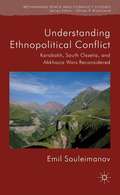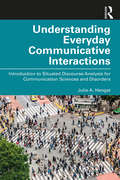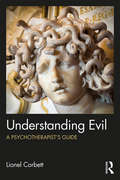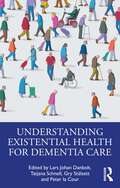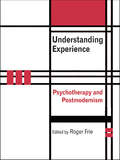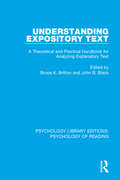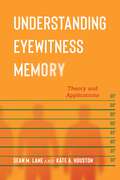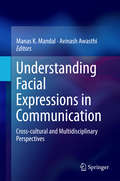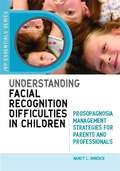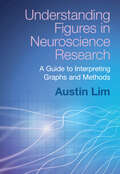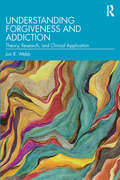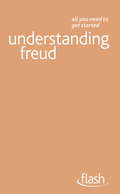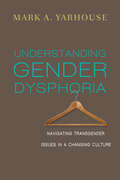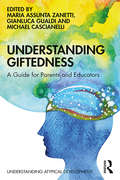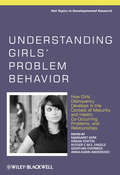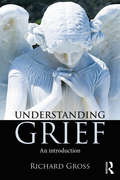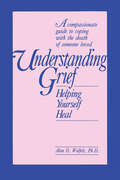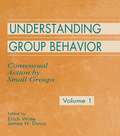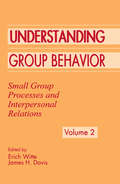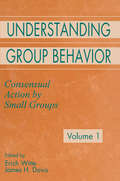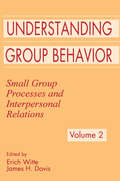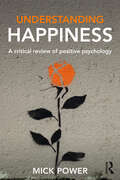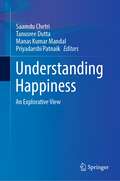- Table View
- List View
Understanding Ethnopolitical Conflict
by Emil SouleimanovThis book critically evaluates the growing body of theoretical literature on ethnic conflict and civil war, using empirical data from three major South Caucasian conflicts, evaluating the relative strengths and weaknesses of the available methodological approaches.
Understanding Everyday Communicative Interactions: Introduction to Situated Discourse Analysis for Communication Sciences and Disorders
by Julie A. HengstUnderstanding Everyday Communicative Interactions is a unique text that uses a situated discourse analysis (SDA) framework to examine basic human communication and the interactions of those with communicative disorders in everyday and clinical settings. The book introduces SDA as a theoretical and empirical approach for examining the complexities of communicative interaction. It explores how people collaborate in everyday contexts to communicate successfully and how they learn to do so. From close analysis of a pretend game played by two children and their father to an observation of a man with aphasia and his family at a football match, the present volume offers rich portraits of communicative lives and illustrates the applications of SDA. The final part of the book uses SDA methods to demonstrate how clinicians can function as communication partners even during assessments and can design rich communicative environments for therapeutic interventions. In explaining the SDA framework and equipping readers with the tools to understand the nature of human communication, this sophisticated and engaging book will be an essential reference for students, researchers, and clinicians in communication sciences and disorders.
Understanding Evil: A Psychotherapist’s Guide
by Lionel CorbettEvil is a ubiquitous, persistent problem that causes enormous human suffering. Although human beings have struggled with evil since the dawn of our species, we seem to be no nearer to ending it. In this book, Lionel Corbett describes the complexity of the problem of evil, as well as many of our current approaches to understanding it, in ways that are helpful to the practicing psychotherapist, psychoanalyst, or Jungian analyst. Psychotherapists often work with people who have been the victim of evil, and, occasionally, the therapist is faced with a perpetrator of evil. To be helpful in these situations, the practitioner must understand the problem from several points of view, since evil is so complex that no single approach is adequate. Understanding Evil: A psychotherapist’s guide describes a range of approaches to evil based on Jungian theory, psychoanalysis, social sciences, philosophy, neurobiology, mythology, and religious studies. The book clarifies the difference between actions that are merely wrong from those that are truly evil, discusses the problem of detecting evil, and describes the effects on the clinician of witnessing evil. The book also discusses what is known about the psychology of terrorism, and the question of whether a spiritual approach to evil is necessary, or whether evil can be approached from a purely secular point of view. In Understanding Evil, a combination of psychoanalytic and Jungian theory allows the practitioner a deep understanding of the problem of evil. The book will appeal to analytical psychologists and psychotherapists, psychoanalysts, and academics and students of Jungian and post-Jungian studies. It will also be of great interest to researchers approaching the question of evil from a variety of other fields, including philosophy and religious studies.
Understanding Existential Health for Dementia Care
by Tatjana Schnell Lars Johan Danbolt Gry Stålsett Peter La CourUnderstanding Existential Health for Dementia Care is a groundbreaking book that describes how existential health can enrich and expand bio-psycho-social approaches to dementia care, recognizing that well-being extends beyond physical, neurological, and cognitive symptoms. This book equips professionals, clinicians, and caregivers to integrate existential dimensions into person-centered care, emphasizing the role of meaning in life and emotional connection for dealing with illness and suffering.Beginning with an introduction to the concept of existential health, the book connects this to an overall understanding of health related to dementia care. Core themes include the coincidence of suffering and meaning, fear of dementia, challenges to personhood, and multicultural perspectives. The book then provides an overview of how existential health can enhance person-centered care, addressing different types of dementia, neurological changes, emotional factors, and daily life functioning.The final section provides examples of existential support, including tools for meaningful conversations and existential exploration. The last chapter weaves together the book’s thematic threads, highlighting how past experiences contribute to present sense of meaning, identity, and connectedness in people with dementia.It is valuable reading for professionals in dementia care—nurses, psychologists, doctors, and chaplains—as well as for caregivers seeking inspiration and students in medicine, nursing, psychology, theology, and social work.
Understanding Experience: Psychotherapy and Postmodernism
by Roger FrieUnderstanding Experience: Psychotherapy and Postmodernism is a collection of innovative interdisciplinary essays that explore the way we experience and interact with each other and the world around us. The authors address the postmodern debate in psychotherapy and psychoanalysis through clinical and theoretical discussion and offer a view of the person that is unique and relevant today.The clinical work of Binswanger, Boss, Fromm, Fromm-Reichmann, Laing, and Lacan is considered alongside the theories of Buber, Heidegger, Husserl, Merleau-Ponty, Sartre and others. Combining clinical data from psychotherapy and psychoanalysis with insights from European philosophy, this book seeks to fill a major gap in the debate over postmodernism and bridges the paradigmatic divide between the behavioural sciences and the human sciences. It will be of great interest to clinicians and students of psychotherapy and psychoanalysis who wish to come to terms with postmodernism, as well as those interested in the interaction of psychoanalysis, philosophy and social theory.
Understanding Expository Text: A Theoretical and Practical Handbook for Analyzing Explanatory Text (Psychology Library Editions: Psychology of Reading #1)
by Bruce K. Britton and John B. BlackOriginally published in 1985, the various chapters in this volume give examples of research on all three aspects of text understanding – namely, structure, world knowledge and process. More than this, however, the research described represents a shift in emphasis from studying stories, which dominated the field in the late 1970s, to studying expository text. This focus on stories was probably due to the essential first step in any science of examining the simplest materials possible. However, the editors thought that it was time to shift the research focus from stories to expository text and this volume is their attempt to provide this transition.
Understanding Eyewitness Memory: Theory and Applications (Psychology and Crime)
by Sean M. Lane Kate A. HoustonAn essential overview of how perception and memory affect eyewitness testimonyIn 1981, sixteen-year-old Michael Williams was convicted on charges of aggravated rape based on the victim’s eyewitness testimony. No other evidence was found linking him to the attack. After nearly twenty-four years, Williams was released after three separate DNA analyses proved his innocence. The victim still maintains that Williams was the culprit.This heartbreaking case is but one example of eyewitness error. In Understanding Eyewitness Memory, Sean M. Lane and Kate A. Houston delve into the science of eyewitness memory. They examine a number of important topics, from basic research on perception and memory to the implications of this research on the quality and accuracy of eyewitness evidence. The volume answers questions such as: How do we remember and describe people we’ve encountered? What is the nature of false and genuine memories? How do emotional arousal and stress affect what we remember?Understanding Eyewitness Memory offers a brilliant overview of how memory and psychology affect eyewitness testimony, where quality and accuracy can mean the difference between wrongful imprisonment and true justice.
Understanding Facial Expressions in Communication
by Manas K. Mandal Avinash AwasthiThis important volume provides a holistic understanding of the cultural, psychological, neurological and biological elements involved in human facial expressions and of computational models in the analyses of expressions. It includes methodological and technical discussions by leading scholars across the world on the subject. Automated and manual analysis of facial expressions, involving cultural, gender, age and other variables, is a growing and important area of research with important implications for cross-cultural interaction and communication of emotion, including security and clinical studies. This volume also provides a broad framework for the understanding of facial expressions of emotion with inputs drawn from the behavioural sciences, computational sciences and neurosciences.
Understanding Facial Recognition Difficulties in Children: Prosopagnosia Management Strategies for Parents and Professionals
by Nancy MindickCan you imagine not being able to recognize those you know if they wore glasses, changed their hairstyle, or perhaps put on a hat? Prosopagnosia is a severe facial recognition disorder that is thought to impact around two per cent of the population. Frequently found in children on the autism spectrum, those with the condition have difficulties distinguishing between one face and the next, meaning that they may not recognize even those who are closest to them. Nancy L. Mindick provides parents, teachers, and other professionals with an accessible explanation of the different types, causes, and characteristics of prosopagnosia. Providing an insider's perspective on the condition, she suggests ways to recognize the signs of facial recognition difficulties in children, and offers specific ideas for ensuring that they are properly supported in their learning and social development. The issues of diagnosis and disclosure are explored, and the author offers practical management strategies for helping children to cope with the condition and to navigate the many different social situations they will encounter at home, at school, and in the community. This book offers specific, practical information for parents, teachers, child psychologists, and anyone else who wishes to support the learning and development of a child with a facial recognition disorder.
Understanding Figures in Neuroscience Research: A Guide to Interpreting Graphs and Methods
by Austin LimThis innovative text introduces neuroscience students to the visual language of scientific publications, teaching scientific literacy, research methods, and graphical literacy in an engaging way. Employing a 'pictures first' pedagogical approach, it walks the reader step-by-step through the interpretation of neuroscience figures and explains the principles of experimental design. The major research techniques – from neuroimaging, to behavioral methods, to genetics and comparative approaches – are explored, illuminating how they are represented graphically in journal articles, and their strengths and limitations as a research tool. More than 130 example figures provide experimental paradigms for the more difficult-to-visualize methods, and depict actual results taken from the recently published scientific literature. Data from several study designs are discussed, including clinical case studies, meta-analyses, and experiments from behavior to molecular genetics. Concrete examples of experiments are provided along with each method, helping students with the design of their own research questions.
Understanding Forgiveness and Addiction: Theory, Research, and Clinical Application
by Jon R. WebbThis book integrates and synthesizes numerous empirically supported positive psychological constructs and psychotherapeutic theories to help understand addiction and facilitate recovery through the lens of forgiveness. Proposing forgiveness as an alternative and critical tool to understanding the process of addiction and recovery, whether in the context of substance use, compulsive behavior, and/or suicidal behavior, the book discusses multiple theoretical points of view regarding the process of forgiveness. Additionally, foundational theories underlying the process of recovery, the psychological and spiritual nature of forgiveness, and the nature of the association of forgiveness with health all receive detailed coverage. Considerable attention is also paid to the extant empirical support for the association of forgiveness with addiction and recovery. The text’s comprehensive integration of theory, research, and clinical application, including guidelines regarding forgiveness as a treatment for recovery from addiction, provide a roadmap forward for addiction counselors and other recovery specialists.
Understanding Freud: Flash
by Ruth SnowdenThe books in this bite-sized new series contain no complicated techniques or tricky materials, making them ideal for the busy, the time-pressured or the merely curious. Understanding Freud is a short, simple and to-the-point guide to the life and work of Sigmund Freud. In just 96 pages, the reader will discover Freud's model of the mind, learn about his theory of psychosexual development and find out about the origins of psychoanalysis. Ideal for the busy, the time-pressured or the merely curious, Understanding Freud is a quick, no-effort way to break into this fascinating topic.EXPLORE FREUD'S LIFESTUDY THE KEY CONCEPTSUNDERSTAND PSYCHOANALYSISDISCOVER HIS INFLUENCE
Understanding Freud: Flash
by Ruth SnowdenThe books in this bite-sized new series contain no complicated techniques or tricky materials, making them ideal for the busy, the time-pressured or the merely curious. Understanding Freud is a short, simple and to-the-point guide to the life and work of Sigmund Freud. In just 96 pages, the reader will discover Freud's model of the mind, learn about his theory of psychosexual development and find out about the origins of psychoanalysis. Ideal for the busy, the time-pressured or the merely curious, Understanding Freud is a quick, no-effort way to break into this fascinating topic.EXPLORE FREUD'S LIFESTUDY THE KEY CONCEPTSUNDERSTAND PSYCHOANALYSISDISCOVER HIS INFLUENCE
Understanding Gender Dysphoria: Navigating Transgender Issues in a Changing Culture (Christian Association for Psychological Studies Books)
by Mark A. YarhouseForeword Reviews' 18th Annual INDIEFAB Honorable Mention for Psychology
Understanding General Deterrence
by Stephen L. QuackenbushThis book bridges the divide between formal and quantitative studies of deterrence by empirically testing and extending perfect deterrence theory. The author focuses on general deterrence, which relates to managing relations between states at all times, not only during crises.
Understanding Giftedness: A guide for parents and educators (Understanding Atypical Development)
by Gianluca Gualdi Maria Assunta Zanetti Michael CascianelliThis concise, accessible guide explores the different models behind the concept of giftedness, examining the criteria for evaluating and identifying gifted children, in order to provide a deeper understanding of the lives of children and young people with high cognitive potential. It offers practical advice to parents and teachers, highlighting common queries and misconceptions and presenting evidence-based suggestions for management methods. Key topics covered include the difference between being gifted and talented, how to identify a gifted child, neurological differences between gifted children and their peers, dealing with perfectionism, and the best ways to parent and teach a gifted child. Avoiding prescriptive rules, the authors emphasise the importance of knowing and understanding the individual child whilst utilising research around giftedness to promote the best possible outcomes. Illustrated with case studies of student and teacher perspectives, the book offers an inclusive perspective and practical strategies, whereby the development of individual potential is viewed not only as a way to promote the psychological well-being of the individual but also as an opportunity and benefit for society. Understanding Giftedness is essential reading for parents and caregivers, as well as practitioners in clinical and educational psychology, counselling, mental health, nursing, child welfare, public healthcare and those in education who want to help young people develop their talents and achieve their full potential.
Understanding Girls' Problem Behavior
by Anna-Karin Andershed Margaret Kerr Håkan Stattin Geertjan Overbeek Rutger C. EngelsUnderstanding Girls' Problem Behavior presents an overview of recent studies by leading researchers into key aspects of the development of problem behavior in girls.Integrates interdisciplinary research into girls' problem behaviors (e.g. aggression, antisocial behavior, rule breaking)Unique in seeking to understand girls' problem behaviors in their own rightFollows the maturing girl from adolescence to adulthood, concluding at the point where she herself becomes a parent and forms new relationshipsGives attention to the critical contexts of problem behavior development--society and neighborhood, as well as family and peer contexts
Understanding Grief: An Introduction
by Richard GrossUnderstanding Grief is a comprehensive and accessible 'one stop' introduction to all the major models of grief. In addition to the individual perspective, bereavement is discussed in relation to social, cultural and religious factors and influences. Richard Gross also examines the impact of different types of bereavement, such as the death of a child, parent, spouse/partner, and sibling, and discusses the impact of traumatic death in relation to complicated grief. The text also covers pet loss, death anxiety, and post-traumatic growth. This innovative book combines personal accounts of grief with clinical accounts of patients provided by psychiatrists and psychologists, and research involving large numbers of bereaved individuals. Understanding Grief will be invaluable to all those working with bereaved clients, including bereavement counsellors, counselling and clinical psychologists, healthcare professionals, social workers, and the interested layperson. It is also suitable for people training to work with bereaved individuals.
Understanding Grief: Helping Yourself Heal (Understanding Your Grief Ser.)
by Alan WolfeltThis classic resource helps guide the bereaved person through the loss of a loved one, and provides an opportunity to learn to live with and work through the personal grief process.
Understanding Group Behavior: Volume 1: Consensual Action By Small Groups
by James H. Davis Erich H. WitteThese books grew out of the perception that a number of important conceptual and theoretical advances in research on small group behavior had developed in recent years, but were scattered in rather fragmentary fashion across a diverse literature. Thus, it seemed useful to encourage the formulation of summary accounts. A conference was held in Hamburg with the aim of not only encouraging such developments, but also encouraging the integration of theoretical approaches where possible. These two volumes are the result. Current research on small groups falls roughly into two moderately broad categories, and this classification is reflected in the two books. Volume I addresses theoretical problems associated with the consensual action of task-oriented small groups, whereas Volume II focuses on interpersonal relations and social processes within such groups. The two volumes differ somewhat in that the conceptual work of Volume I tends to address rather strictly defined problems of consensual action, some approaches tending to the axiomatic, whereas the conceptual work described in Volume II is generally less formal and rather general in focus. However, both volumes represent current conceptual work in small group research and can claim to have achieved the original purpose of up-to-date conceptual summaries of progress on new theoretical work.
Understanding Group Behavior: Volume 1: Consensual Action By Small Groups; Volume 2: Small Group Processes and Interpersonal Relations
by James H. Davis Erich H. WitteThese books grew out of the perception that a number of important conceptual and theoretical advances in research on small group behavior had developed in recent years, but were scattered in rather fragmentary fashion across a diverse literature. Thus, it seemed useful to encourage the formulation of summary accounts. A conference was held in Hamburg with the aim of not only encouraging such developments, but also encouraging the integration of theoretical approaches where possible. These two volumes are the result. Current research on small groups falls roughly into two moderately broad categories, and this classification is reflected in the two books. Volume I addresses theoretical problems associated with the consensual action of task-oriented small groups, whereas Volume II focuses on interpersonal relations and social processes within such groups. The two volumes differ somewhat in that the conceptual work of Volume I tends to address rather strictly defined problems of consensual action, some approaches tending to the axiomatic, whereas the conceptual work described in Volume II is generally less formal and rather general in focus. However, both volumes represent current conceptual work in small group research and can claim to have achieved the original purpose of up-to-date conceptual summaries of progress on new theoretical work.
Understanding Group Behavior: Volume 1: Consensual Action By Small Groups; Volume 2: Small Group Processes and Interpersonal Relations
by James H. Davis Erich H. WitteThese books grew out of the perception that a number of important conceptual and theoretical advances in research on small group behavior had developed in recent years, but were scattered in rather fragmentary fashion across a diverse literature. Thus, it seemed useful to encourage the formulation of summary accounts. A conference was held in Hamburg with the aim of not only encouraging such developments, but also encouraging the integration of theoretical approaches where possible. These two volumes are the result. Current research on small groups falls roughly into two moderately broad categories, and this classification is reflected in the two books. Volume I addresses theoretical problems associated with the consensual action of task-oriented small groups, whereas Volume II focuses on interpersonal relations and social processes within such groups. The two volumes differ somewhat in that the conceptual work of Volume I tends to address rather strictly defined problems of consensual action, some approaches tending to the axiomatic, whereas the conceptual work described in Volume II is generally less formal and rather general in focus. However, both volumes represent current conceptual work in small group research and can claim to have achieved the original purpose of up-to-date conceptual summaries of progress on new theoretical work.
Understanding Group Behavior: Volume 1: Consensual Action By Small Groups; Volume 2: Small Group Processes and Interpersonal Relations
by James H. Davis Erich H. WitteThese books grew out of the perception that a number of important conceptual and theoretical advances in research on small group behavior had developed in recent years, but were scattered in rather fragmentary fashion across a diverse literature. Thus, it seemed useful to encourage the formulation of summary accounts. A conference was held in Hamburg with the aim of not only encouraging such developments, but also encouraging the integration of theoretical approaches where possible. These two volumes are the result. Current research on small groups falls roughly into two moderately broad categories, and this classification is reflected in the two books. Volume I addresses theoretical problems associated with the consensual action of task-oriented small groups, whereas Volume II focuses on interpersonal relations and social processes within such groups. The two volumes differ somewhat in that the conceptual work of Volume I tends to address rather strictly defined problems of consensual action, some approaches tending to the axiomatic, whereas the conceptual work described in Volume II is generally less formal and rather general in focus. However, both volumes represent current conceptual work in small group research and can claim to have achieved the original purpose of up-to-date conceptual summaries of progress on new theoretical work.
Understanding Happiness: A critical review of positive psychology
by Mick PowerWe all want to be happy, and there are plenty of people telling us how it can be achieved. The positive psychology movement, indeed, has established happiness as a scientific concept within everyone's grasp. But is happiness really something we can actively aim for, or is it simply a by-product of how we live our lives more widely? Dr. Mick Power, Professor of Clinical Psychology and Director of Clinical Programmes at the National University of Singapore, provides a critical assessment of what happiness really means, and the evidence for how it can be increased. Arguing that negative emotions are as important to overall well-being as the sunnier sides of our disposition, the book examines many of the claims of the positive psychology movement, including the relationship between happiness and physical health, and argues that resilience, adaptability in the face of adversity, psychological flexibility, and a sense of generativity and creativity are far more achievable as life goals. This is a book which will fascinate anyone interested in positive psychology, or anyone who has ever questioned the plethora of publications suggesting that blissful happiness is ten easy steps away.
Understanding Happiness: An Explorative View
by Tanusree Dutta Manas Kumar Mandal Saamdu Chetri Priyadarshi PatnaikThis book provides a comprehensive and enriching understanding of the construct of happiness from diverse perspectives. It provides readers with an overview of the issues, problems, and challenges related to well-being and happiness. The book is divided into three sections. It brings together researchers and practitioners from various disciplines, including psychology, sociology, and development studies. Each section includes chapters from leading academicians from across the world. The first section helps the reader understand happiness from a neuroscientific perspective and explores the relationship between happiness and subjective well-being. The second section of the book discusses the importance of building personal resources for happiness from a positive psychology point of view. The last section examines the importance of happiness in the workplace and suggests a sustainable development plan for happiness. It is a must-buy book for individuals nurturing critical thought and searching for a quintessential understanding of happiness. It presents a unique contribution to the literature with its multidisciplinary focus on specific topics.
